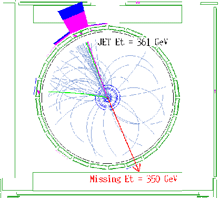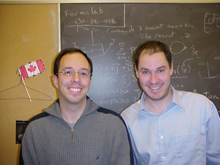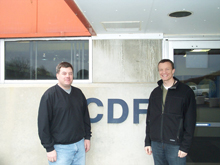 | Thursday, December 8, 2005 |
|
Thursday, December 8 9:30 a.m. Presentations to the Physics Advisory Committee - Curia II 11:00 a.m. Academic Lecture Series - 1 West Speaker: P. Langacker, Fermilab/University of Pennsylvania Title: Tests of the Electroweak Theory – Lecture 4 2:30 p.m. Theoretical Physics Seminar - 1 West Speaker: Z. Chacko, University of Arizona Title: Twin Higgs Theories 3:30 p.m. Director's Coffee Break - 2nd Flr X-Over 4:00 p.m. Accelerator Physics and Technology Seminar - 1 West Speaker: R. Zwaska, University of Texas Title: Booster Cogging Friday, December 9
Saturday, December 10 |
|
Extended Forecast |
Secon Level 3 |
|
Thursday, December 8 -Santa Fe Black Bean -Sloppy Joe -Stuffed Peppers -Sauteed Liver and Onions -Baked Ham and Swiss on a Ciabatta Roll -California Pizza -Crispy Fried Chicken Ranch Salad The Wilson Hall Cafe accepts Visa, Master Card, Discover and American Express at Cash Register #1. |
|
Thursday, December 8
Wednesday, December 14
Chez Leon Menu |
| Fermilab Today is online at: http://www.fnal.gov/today/ Send comments and suggestions to today@fnal.gov Fermilab Today archive Hurricane Relief Page Fermilab Today PDF Version Fermilab Result of the Week archive Fermilab Safety Tip of the Week archive Linear Collider News archive Fermilab Today classifieds Subscribe/Unsubscribe to |
| MINOS Reaches Milestone of 1E20 Protons on Target |
|
On Tuesday, December 6, 2005, the MINOS experiement reached a milestone of 1E20 protons delivered on target. Stan Wojcicki, the MINOS co-spokesperson, wrote the following letter to thank all for their hard work.
December 6, 2005: — Stan Wojcicki |
Grids in Class and at the Museum
The I2U2 goal is to support and strengthen the education and outreach activities of grid-based scientific experiments. The project, recently funded by the National Science Foundation, will provide two options to scientists building an educational program: e-Labs, for use by students in a formal educational setting; and i-Labs for informal education, such as museum exhibits. The I2U2 team of teachers, scientists and grid developers is creating an e-Lab toolkit for use by scientific collaborations, and is piloting the i-Labs with the Chicago's Adler Planetarium.
|
|
From HindustanTimes.com, December 6, 2005: Recreating Big Bang to learn more about universe A multi-nation effort at Geneva-based CERN laboratory to recreate conditions existing just after the Big Bang could give vital clues to the creation of the universe and help overcome prejudices against this widely held scientific theory, an eminent science writer said in Kolkata on Tuesday.
Through its Large Hadron Collidor (LHC), which is expected to collide basic constituents of matter and recreate hot and dense conditions of Big Bang scenario, the European laboratory might also end up discovering new applications of the technique in particle physics, Simon Singh, BBC broadcaster and science writer, told newsperson on the sidelines of 'Big Bang The History Of The Universe' lecture.
|
| CDF Gets the LED Out | ||||
| ||||
|
Exciting new theories have proposed that there are extra dimensions
of space, beyond the normal three of everyday experience. These
models of "Large Extra Dimensions" (LED)
seek to explain the relative weakness of gravity, compared
to the other known forces. While the extra dimensions of space
cannot be too large, or otherwise they would have already been observed,
their effects could be detected at high energy colliders like
Fermilab's Tevatron.
CDF physicists have been searching for hints of these extra dimensions by studying events where the remains of a single quark or gluon seem to recoil against nothing. If the models are correct, the quark or gluon could be recoiling against one of the carriers of gravity that escapes undetected into the extra dimensions. CDF has recently released a new result using 368 pb-1 of data that places limits on the possible size of the extra spatial dimensions. The size of the extra dimensions depends on how many there are. The new limits on the largest possible size of the dimensions range from 0.36 mm if there are two, down to 3.4x10-11 mm if there are six, which is the most stringent limit from any experiment in the world. While no definitive evidence for new dimensions of space has been observed yet, CDF will continue to look. As we accumulate more data in RunII, our sensitivity continues to improve, allowing us to probe ever smaller distances.
|
||||
| ||||
| Result of the Week Archive |
|
December 5 - 7 - NuMI hits integrated total of 1E20 protons on target. - CUB LCW leak. - TeV sector A4 cryo system helium leak repaired. - TeV sector B1 cryo system cold.
Read the Current Accelerator Update
|
|
CDSystem Status Page Moving
Missing Box Lederman Science Center Sale Today The Lederman Science Center will sell Fermilab logo items today from 11:00 a.m. to 1:30 p.m. just outside of 1-West in Wilson Hall. They will be selling fleece stadium blankets, award-winning science kits, fun science toys, mugs and knit caps. You may purchase the items with cash, check, Visa or Mastercard.
|



